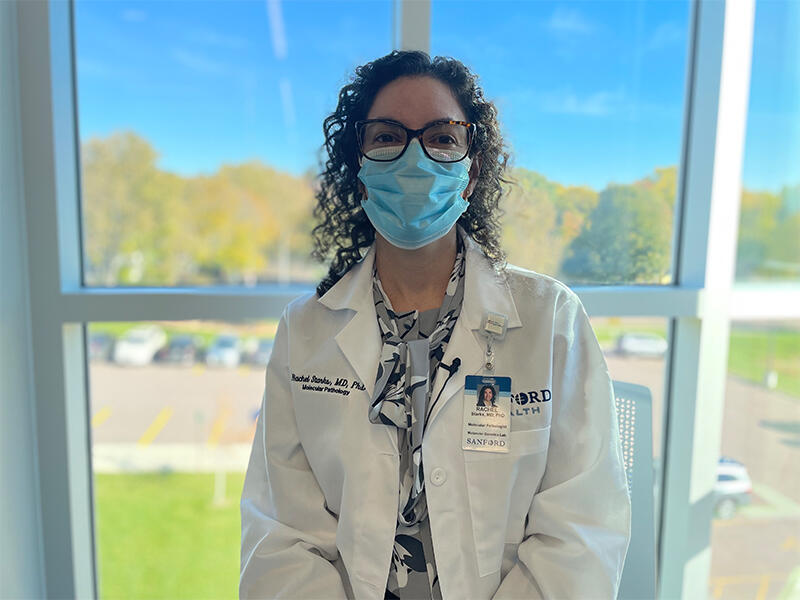If fighting diseases was a sport, Sanford Health just signed a big free agent.
Rachel Starks, M.D., is the first and only molecular pathologist at Sanford Health. Molecular pathology focuses on studying and diagnosing diseases by observing patients’ molecules.
The best of both worlds
Dr. Starks said when she was an undergraduate at the University of Arizona, her major was molecular and cell biology.
“Looking at the processes that happen at the level of the cell, and even the DNA of the cell, just made everything make a lot more sense. And so it was really nice to just focus in on that and break it down to just what’s going on at the DNA level of the cell. And how does that change what the cell is doing?” she said.
Later, she took up graduate and medical schools, as well as her residency at the University of Iowa. It was there when she was introduced to pathology, or identifying the cause of certain diseases and observing clinical findings.
“When I went to graduate school, I continued my focus on molecular and cell biology. So, while I was doing residency in pathology, I found out about molecular pathology and it was just wonderful because it was the two things that I liked the most,” she said.
Small circle, big outcomes
Dr. Starks explained there aren’t many molecular pathologists in the country, much less in the Midwest. She said that’s what makes her position at Sanford Health unique.
“Most of the molecular pathologists can be found on the East and West Coasts, in the major academic medical centers. But, more and more hospitals are asking for genetic testing for their patients, whether it’s for screening or for their cancer patients.
“So, genetic testing is becoming more and more part of standard of care. Being able to bring the specialized experience that I have and education and training for molecular pathology to Sanford Health and the Sanford Health care enterprise is just really exciting,” Dr. Starks said.
Part of the excitement surrounding Dr. Starks’ employment at Sanford Health is due to how patients could benefit from the resources and expertise Dr. Starks brings with her. Currently, when testing for cancers, Dr. Starks explained Sanford Health sends collections to outside testing agencies or laboratories.
“This can result in longer turnaround times and disconnect between the lab that’s doing the testing and the clinician that’s seeing the patient,” she said.
“And so, that’s one of the areas that the lab is getting ready to move into that we’re not currently doing, is being able to directly test our patients’ cancer samples here. We’ll be able to provide that direct care right away.”
Helping patients from afar
Molecular pathologists typically won’t see patients face-to-face. However, given the nature of their work, they’re still helping patients in a critical way, Dr. Starks said.
“I work with the clinicians and the providers that do see the patients. The pathologist, in general, is sort of a consultant for the clinicians. We provide information that we get from testing the patient’s samples, to be able to help the clinicians take that information and make decisions, and give information to the patients themselves.
“So, as part of the genetics team, I’ll be able to make sure the results are reliable, accurate, and have a high level of quality behind them to understand those results and how to best apply them to the patients,” she said.
Midwest location is a benefit
Dr. Starks said having the opportunity to bring her expertise to a health care system that hasn’t had her position before was a big reason she chose to sign on at Sanford Health. She said she’s eager to make an impact within Sanford’s communities.
And community is another big reason why she decided on Sanford. Dr. Starks said during her residency at the University of Iowa she “fell in love with the Midwest.”
“One of the reasons was the location. I mentioned before, a lot of the jobs are larger cities, academic centers, East Coast, West Coast. I had been in Iowa for about 12 years, and I really liked the Midwest. Having the opportunity to stay in the Midwest and to do the work that I want to do, and to be able to be part of a team like this, it all fit together,” she said.
Learn more
- Veterans get free genetic testing at Sanford Health
- Sanford genetics group shares benefits of custom kids’ care
- New lab equips Fargo for faster diagnoses
…
